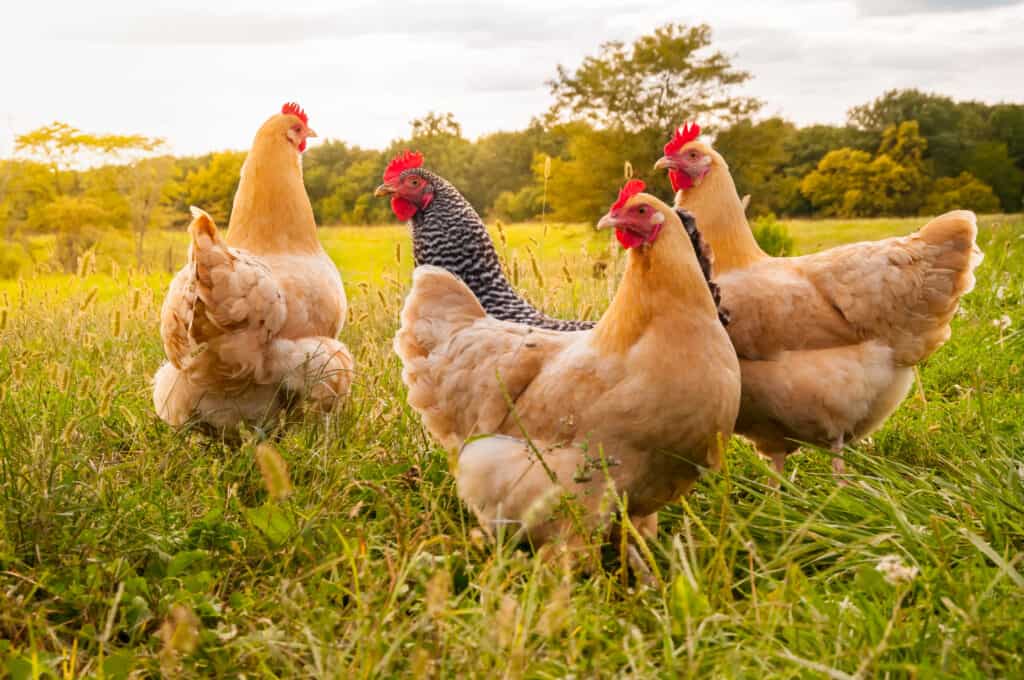Domestic chickens are a bit like nature’s little garbage disposals, happily and safely able to gobble up a surprisingly wide range of foods. One particular food many flock owners often have questions about, however, is nuts. If you’re wondering if your chickens can safely eat nuts, you’re in the right place: below, we’ll explore the answer to this very question, as well as what types of nuts are safe for your birds, and if there are any sorts of precautions you should take.
Can Chickens Safely Eat Nuts? The Answer Might Surprise You!

Ever wondered if you can feed your chickens nuts? The answer is yes, but you should know a few things first.
©Moonborne/Shutterstock.com
Yes, chickens can safely eat small amounts of unsalted nuts. Tree nuts, as well as peanuts, are not only safe but a healthy addition to your flock’s diet in moderation. While they should not make up the bulk of your chickens’ diet, nuts are a great snack to offer to chickens up to a few times per week. It’s best to chop the nuts into smaller pieces before feeding.
While chickens can safely eat a wide range of foods, it’s important to remember everything in moderation. Too many nuts can cause digestive issues and illness in some birds due to the excess tannins present in them, though a small amount (such as a handful or two of mixed nuts a few times a week) for your birds can be a great source of protein, fiber, healthy fats, and other nutrients, particularly for laying hens.
A healthy, diverse diet that includes various nuts can help strengthen your hens’ eggs’ shells and provide a nutritious energy source for laying and non-laying birds alike. Finally, avoiding salted nuts is best, as excess salt can cause digestive upset and salt poisoning.
How Are Chickens Able to Eat Nuts?
Now that we’ve covered the basics as to whether or not your birds can safely eat nuts, you may be wondering how chickens are actually able to grind them up and swallow them without choking or suffering major digestive problems. It’s a valid question–they have no teeth, so they can’t exactly chew their food quite like we can. Fortunately, they have a helpful body adaptation that helps make up for their lack of teeth.
Within a chicken’s gastrointestinal tract is an organ known as the gizzard or the ventriculus. This small, muscular organ sits just after the bird’s true stomach and helps to grind up foods to digest them better! Without this organ, your chickens wouldn’t be able to eat a wide range of foods, including hard seeds, fibrous vegetables, or even mere insects.
Still, even with the help of the gizzard, some foods can still put excess strain on the organ and cause some digestive upset. This includes harder, more dense foods like nuts. Additionally, this is why nuts are best offered to your flock in small amounts, ideally chopped into smaller pieces. Avoiding feeding your chickens nuts too often can also help your birds digest the nuts more easily.
What Kinds of Nuts Can Chickens Eat?
Fortunately, virtually all unsalted nuts, both tree nuts, and peanuts, are safe for your chickens to consume every now and then. As long as you avoid feeding them nuts in excess, your chickens will benefit greatly from some variety in their diet. Here are some of the nuts your birds can safely eat in small amounts. Remember, chop the nuts into smaller pieces if they are very large, hard, or dense.
- Peanuts
- Almonds
- Walnuts
- Pine nuts
- Brazil nuts
- Pistachios
- Cashews
- Pecans
- Hazelnuts
- Macadamia nuts
Thank you for reading! Have some feedback for us? Contact the AZ Animals editorial team.








